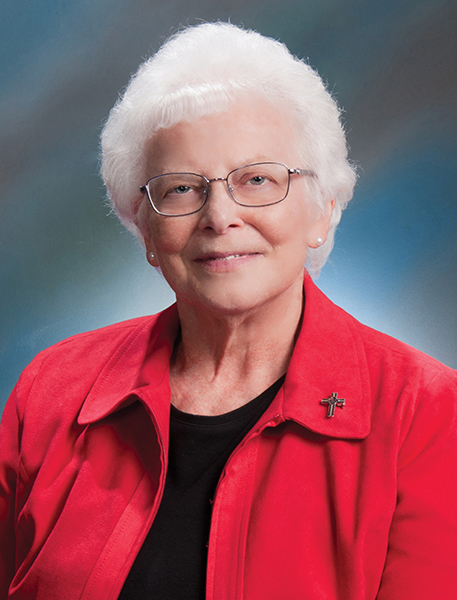
Dear friends and family,
Sister Edna Hess • President, Sisters of the Precious Blood
We are at a new stage in overcoming COVID-19. Many people have been vaccinated, and many restrictions have been lifted. Yet we must continue to be careful, as it is still present in our world. How appropriate that at this time we look back to one of our ministries as Sisters of the Precious Blood — a ministry in which we attended to people who were sick, who were looking for an integral solution for their health problems.
In the central article of this edition, you will read about our 75 years of ministry at Kneipp Springs, Indiana. As I read the article by our archivist, Sarah Aisenbrey, memories came back of my time at Kneipp Springs. As a Fatima Hall girl — a student at the Congregation’s aspirancy high school in Dayton — in the early 1960s I spent time, over three summers, helping the Sisters who were working there. I assisted the Sister who was hostess of the dining room; I removed the tea cups the people drank before their meals; I helped roll out pie dough; I picked apples.
The “Kneipp Cure” developed by Dr. Sebastian Kneipp sought to cure or prevent illness by bringing together mind, body and spirit. It reminded me of the term “holistic” which is used today. When talking about a holistic approach, the overall health of a patient is considered, including their physical, psychological, social and spiritual well-being.
What joy to think that Sister Margaret Schlachter (the first superior of Kneipp Springs) and Mother Ludovica Scharf (Mother General at the time) recognized already in the early 1900s the importance of treating the whole person. Over the years we have had Sisters who participated in health care in a variety of roles — physician, nurses, nursing assistants, mental health therapists. Many have carried out their ministry in professional roles and maintained longtime careers, while others have had informal roles as caregivers to family members or to their fellow Sisters. Either way, I am sure the health ministry carried out by each Sister was a holistic one, in which body, mind and soul were all cared for.
Jesus himself recognized that healing was not only physical. The Gospel of Luke 5:17-26 recounts the story of the day Jesus was teaching when some men came, carrying a paralyzed man on a bed. When Jesus’ first response is to forgive the man’s sins, the scribes and Pharisees in attendance are astonished. “Who is this who is speaking blasphemies?” they ask. “Who can forgive sins but God alone?”
Jesus responds, “Which is easier, to say, ‘Your sins are forgiven you,’ or to say, ‘Stand up and walk’?” Then, so that the scribes and Pharisees may know that the Son of Man has authority on earth to forgive sins, he tells the paralyzed man to stand up, take his bed and go home.
Jesus knew that the man’s paralysis was not only physical. Jesus’ first act was spiritual healing; then, he also healed him physically. For those who witnessed this occurrence, the Scripture tells us that “amazement seized all of them, and they glorified God and were filled with awe.”
Indeed we all can continue to be filled with awe if we remember to recognize and appreciate that through our flaws, our imperfections and our sin, we are blessed with the amazing gift of humanity: a mind to think and a heart to feel; our physical selves to use as we move through life; and souls that we can develop through prayer and fellowship to become ever closer to God.
Just as with the paralyzed man, so it is for all of us. We need to attend to our whole person — not just our physical health, but also our psychological, social and spiritual health. To be holy is to attend to each of these aspects in our lives.





